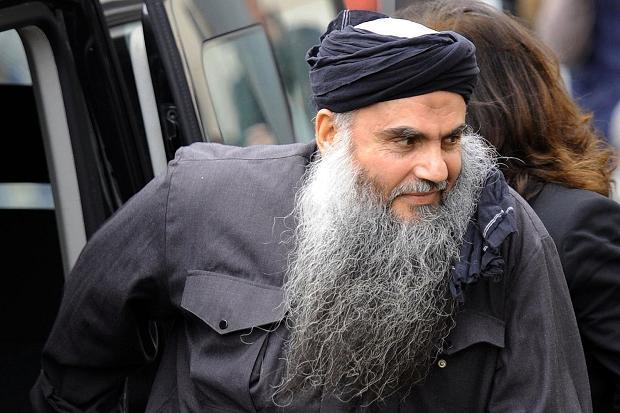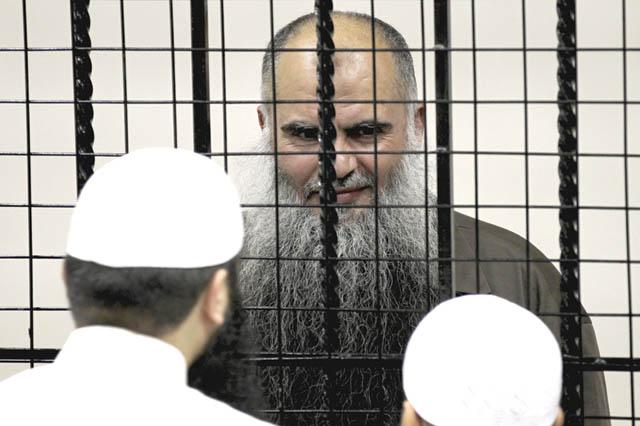You are here
Abu Qatada defence team requests court delay amid ‘dwindling funds’
By Taylor Luck - Mar 27,2014 - Last updated at Mar 27,2014

AMMAN — The defence team for extremist cleric Abu Qatada on Thursday requested a delay in proceedings from the State Security Court, citing a lack of funds to produce expert witnesses for their client.
In a session on Thursday, defence attorney Ghazi Thneibat requested a two-week stay in court proceedings in order to produce expert witnesses for his client Mahmoud Othman, known Abu Qatada, who faces terrorism charges.
“We currently do not have the funds to provide and register expert witnesses who are vital to my client’s defence, and to protest these charges,” Thneibat told the state prosecutor, and later The Jordan Times.
“We simply cannot proceed under the current circumstances.”
The court granted Thneibat a two-week period to produce the witnesses, calling for the trial to resume on April 10.
Thursday was to mark the opening of defence witness testimonies in the five-month-old case.
According to Thneibat, the cleric’s legal team aims to produce a telecommunications technology expert, and translate dozens of pages of phone transcripts and court papers from Othman’s previous trial in Britain in order to disprove claims that he had conversations with multiple individuals regarding carrying out terrorist attacks in Jordan.
Thneibat claimed that the translation and authentication of British court documents is set to cost the legal team JD8,000 alone — a sum he says his client does not currently possess.
Meanwhile, Abu Qatada claimed that a fear of “arrest” and persecution in Jordan drove him to request political asylum in Britain and avoid returning to his adopted homeland.
In his first public statements on his life in Britain, Othman told the court that after a period of travelling through Malaysia and Pakistan, he opted to request political asylum in Britain in 1993 rather than return to Jordan, where he would be later be tried in absentia for plotting alleged terror attacks.
“I travelled to Malaysia at the beginning of the 1990s and then on to Pakistan where I served as a teacher at the university of applied technology for a brief period,” Othman told the court prosecutor.
“At the time, many of those returning from Pakistan to Jordan were being arrested, which frightened me... I then went to Britain to request political asylum.”
The often animated and charismatic Othman remained calm and quiet as he carefully responded to the prosecutor’s inquiries, refraining from making political statements or commentating on the growing rift between jihadist groups in Syria as in previous sessions.
The West Bank-born cleric faces a life sentence with hard labour for his alleged role in plotting a series of attacks in Amman, including on the American School and a former intelligence chief.
The British government deported Abu Qatada, a Jordanian national and an influential scholar within the hard-line Salafist movement, to Jordan in August 2013 despite concerns by an EU human rights court that he might face torture or fail to receive a fair trial.
Despite entering a brief hunger strike in protest over access to wider prison facilities, the cleric has largely been “treated well” during his detention and has not suffered duress or torture, according to Othman’s family and his defence attorney.
Related Articles
The State Security Court moved on Thursday to postpone the closing statements by the defence team of hard-line cleric Mahmoud Othman, known as Abu Qatada, to allow the translation of European and British court documents.
The State Security Court prosecutor on Monday filed a petition with the Cassation Court, contesting a court ruling in June in which hard-line cleric Mahmoud Othman, known as Abu Qatada, was cleared of terrorism charges.
The State Security Court (SSC) postponed on Sunday the sentencing of hard-line cleric Abu Qatada as Al Qaeda-aligned preacher continued his war of words against the Islamic State (IS).

















